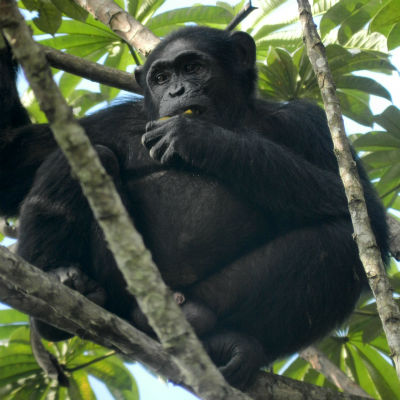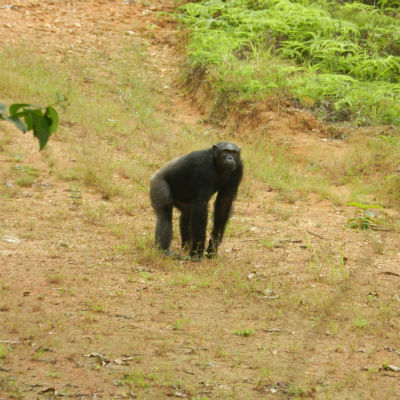Damning great apes to extinction
DAMNING GREAT APES TO EXTINCTION
Born Free’s Field Conservation Assistant Emily Neil explains why the natural habitat of the world’s great apes is coming under increasing threat from mining and oil exploration
“Today was difficult,” I wrote from my tent in northwest Gabon. “After months of searching for chimpanzees, we finally found evidence of a large population. Fresh faeces, knuckle prints, and nearly 60 nests – all new.”
But our excitement at finding these signs was cut short by the growl of a chainsaw and the rumble of trucks; we are in a logging concession. As we hiked we heard what sounded like a massive tree crash to the ground in the distance – the noise echoed around us through the mountains. Not long after, we reached a dirt road carved into the forest, lined with fallen trees on either side. As we followed the footprints of a lone forest elephant down the road, I asked my research assistant if the chimpanzees would stay here. “No,” he said. “If the trees disappear, so will they.”
This story is being repeated across Africa and Asia. Forests around the world are under threat, and an estimated 18.7 million acres are felled each year to fuel global demand for natural resources. The four types of great apes – gorillas, bonobos, chimpanzees, and orangutans – are all threatened with extinction by habitat loss, habitat fragmentation, and hunting. Extractive industries like mining, commercial logging, oil exploration and drilling can be devastating for great apes as they almost always directly contribute to habitat loss.
However, their indirect impacts can be just as detrimental. For example, road construction to transport workers and equipment leads to habitat fragmentation, and also increases access to the forest. Hunters can reach deeper into forests to exploit natural resources and to kill wildlife. Despite the threats posed to great apes, many extractive industries continue their lucrative and destructive practices unabated.
One of these ecologically disastrous projects is currently breaking ground in the Batang Toru ecosystem in northern Sumatra. These primary forests are home to rare and endangered species like Sumatran tigers, pangolins, sun bears, helmeted hornbills, and the newly-discovered and critically endangered Tapanuli orangutan. First described in November 2017, Tapanuli orangutans are already the rarest great ape in the world, with only about 800 individuals remaining.
Sinohydro Corporation, the Chinese state-owned hydropower construction company, is moving forward with building a dam straight through this fragile habitat, despite the major threat it poses to the orangutan and other species in the ecosystem. The project will clear major tracts of forest and flood the orangutan’s core habitat, while also fragmenting the already small population into two even smaller populations. This will reduce their resilience and put them at a much greater risk of extinction. Surviving forest will be disrupted with new roads and power lines, which will disrupt orangutan dispersal and their arboreal movements while also increasing access into the forest. In greenlighting this project, the Indonesian government has violated its own laws – which prohibit activities that would harm a protected species – as this initiative could directly result in the total extinction of the Tapanuli orangutan. More than 1.2 million people have already signed an online petition imploring President Widodo to cancel the project.


Sinohydro is also breaking ground in Guinea, West Africa. Plans are afoot to launch construction of the Koukoutamba hydroelectric dam on the Bafing River, a main tributary of the Senegal River. The dam will generate power for one of the world’s poorest nations, where only 3% of rural homes have electricity. However, sharply illustrating the hand-in-hand promise and peril of massive infrastructure development, it will also flood large tracts of the Moyen-Bafing National Park landscape, which is considered to be one of the most important habitats for the critically endangered Western chimpanzee. Western chimpanzees numbers have declined 80% in the last 20 years, and scientists estimate that up to 1,500 will perish as a result of habitat loss from flooding.
Moyen-Bafing National Park was established just last year with the support of the International Finance Corporation (IFC), the World Bank’s private sector financing arm. Environmental destruction on this scale violates the Environmental and Social Performance Standards of the IFC, which define the private sector’s responsibilities for managing their environmental and social risks. Performance Standard 6 specifically relates to the protection of biodiversity; it “recognises that protecting and conserving biodiversity, maintaining ecosystem services, and sustainably managing living natural resources are fundamental to sustainable development”. Despite this, the World Bank recommended the placement of the Koukoutamba dam, citing “its important contribution to regional hydropower generation and its relatively low environmental impact”. Faced with criticisms regarding the accuracy of their feasibility study, the World Bank has about-faced and is now calling for a moratorium on the project.
Two of the most biodiverse parks in the heart of Central Africa are also under threat from lucrative extractive industries. The Democratic Republic of Congo’s (DRC) government recently announced its decision to review proposals to degazette parts of two UNESCO World Heritage Sites, Salonga and Virunga National Parks, to allow for oil exploration. This is not the first time these parks have come under threat. In 2015, UK-listed oil company Soco International obtained a licence to perform seismic testing inside Virunga. The company let its licence lapse in November 2015, partly due to the intense international pressure following the Virunga documentary.
The newest proposal has been met with fierce resistance from NGOs and civil society in DRC. However, the government has defended its right to authorise drilling anywhere in the country, saying that it is mindful of protecting flora and fauna in both parks. Although countries do have the right to choose how to exploit their resources, the benefits of degazetting Virunga and Salonga will not flow to those most in need. Opening the parks to oil exploration would instead devastate wildlife and natural resources and the country’s cultural heritage.
With its iconic forested volcanoes, Virunga is home to many endemic and endangered species like okapi, forest elephant, eastern Grauer’s gorilla, chimpanzee, and critically endangered mountain gorillas. Salonga is likewise a critical bastion for bonobo, forest elephant, Congo peacock, and African slender-snouted crocodile.
Oil exploration could be a death blow for some of these species, and once lost, they will be gone forever.
